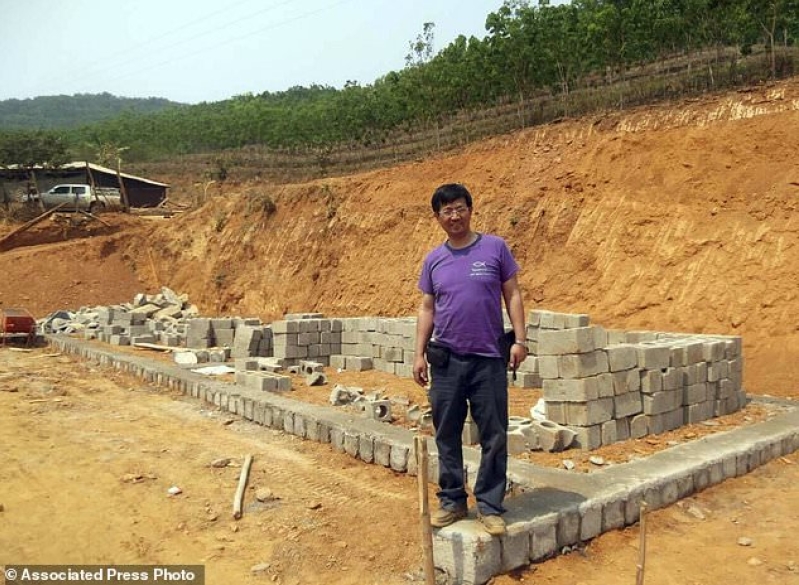
The family of North Carolina pastor sentenced to seven years in a Chinese prison for "organizing an illegal border crossing" has asked the Communist government for mercy, as the pastor's intentions were always "religious or charitable" rather than "political."
Rev. John Sanqiang Cao, who has held U.S. permanent residency since 1990 but kept his Chinese citizenship so that he could continue entering China for his mission work, was arrested last March while engaging in humanitarian work along the China-Burma border.
For years, Cao and his fellow Chinese Christian teachers would cross the river on a narrow bamboo raft from China into neighboring Myanmar, carrying with them notebooks, pencils and Bibles. On the day of the arrest, Cao and a teacher were on a raft returning to Yunnan province when they saw Chinese security agents waiting for them on the shore.
Upon spotting the officials, Cao threw his cellphone into the water, protecting the identities of more than 50 Chinese teachers he had recruited to give ethnic minority Burmese children a free education rooted in Christianity, the AP reports.
A year after his arrest, Cao was sentenced to seven years in prison. He was charged with "organizing others to illegally cross the border," a crime more commonly applied to human traffickers.
Speaking to the AP, Cao's son said the pastor's sentence should be significantly reduced in light of his decades-long humanitarian work.
"Nothing my father organized was ever political. It was always just religious or charitable," said Ben Cao, the pastor's 23-year-old son, a U.S. citizen living in Charlotte, North Carolina. "We hope that China will be merciful, and see that my father's intentions were good."
Cao, a North Carolina pastor well-respected for building 16 schools that service 2,000 impoverished minority children in Myanmar's northern Wa State, was widely acknowledged for his humanitarian work. When earthquakes struck Sichuan province in 2008, and Nepal in 2015, Cao flew in to help victims, his fellow missionaries said, buying clothes for them even as he wore the same grey jacket and shoes for years.
"My father always tried to save as much money as possible so he could give it away," Ben Cao said.
On numerous occasions, the pastor tried to get state approval for many of his projects, even handing over a primary school and health clinic he established to local authorities, his son said. He also did not resist when officials asked him to halt certain undertakings, yet still remained under constant surveillance.
Darek Jarmola, an American teacher who leads Christian youth trips, recalled noticing someone taking pictures of him and Cao while they were having dinner in Hunan last January.
Cao simply ignored the attention, Jarmola said, stating, "I haven't done anything wrong, and if I do, they can arrest me."
Bob Fu, Cao's longtime friend and president of China Aid, a Texas-based Christian rights activist, said the pastor's case shows the Communist party wants to extend its control over the activities of China's Christians even when they are abroad.
"This reflects the tightening environment under President Xi (Jinping) against any kind of religious independence," Fu said. "In the past when they talked about foreign infiltration, they were referring to the activities of foreign missionaries inside China, but that has now expanded to include Chinese missionaries going overseas."
"There were no secrets," Fu added. "He always believed that he operated with the government's tacit blessing."
Xi Lian, a scholar of Christianity in China at Duke University, said Cao was "singled out" for the arrest and noted that pastors with "lower visibility" have been doing similar work along the China-Myanmar border with no repercussions. Cao's prominence in the house church networks, he said, made him "the kind of person that may make the Chinese government nervous."
A U.S. State Department spokesman told the AP that Washington is "deeply concerned" about Cao's sentence and has urged China to release him as a U.S. legal permanent resident on "humanitarian grounds."
Chinese President President Xi Jinping has pursued a plan to "sinicize" -- bring under government control -- the country's major religions, eliminate "foreign influence" and align faiths more closely with the atheist ruling Communist Party's own doctrines.
Xi has said he wants Chinese faith communities to move "to the direction of localizing the religion, practice the core values of socialism, develop and expand the fine Chinese tradition and actively explore the religious thought which accords with China's national circumstances."
The government increasingly views Christianity's rise in China as a threat to its rule, as there are now more than 38 million Protestants in China, according to official estimates.






